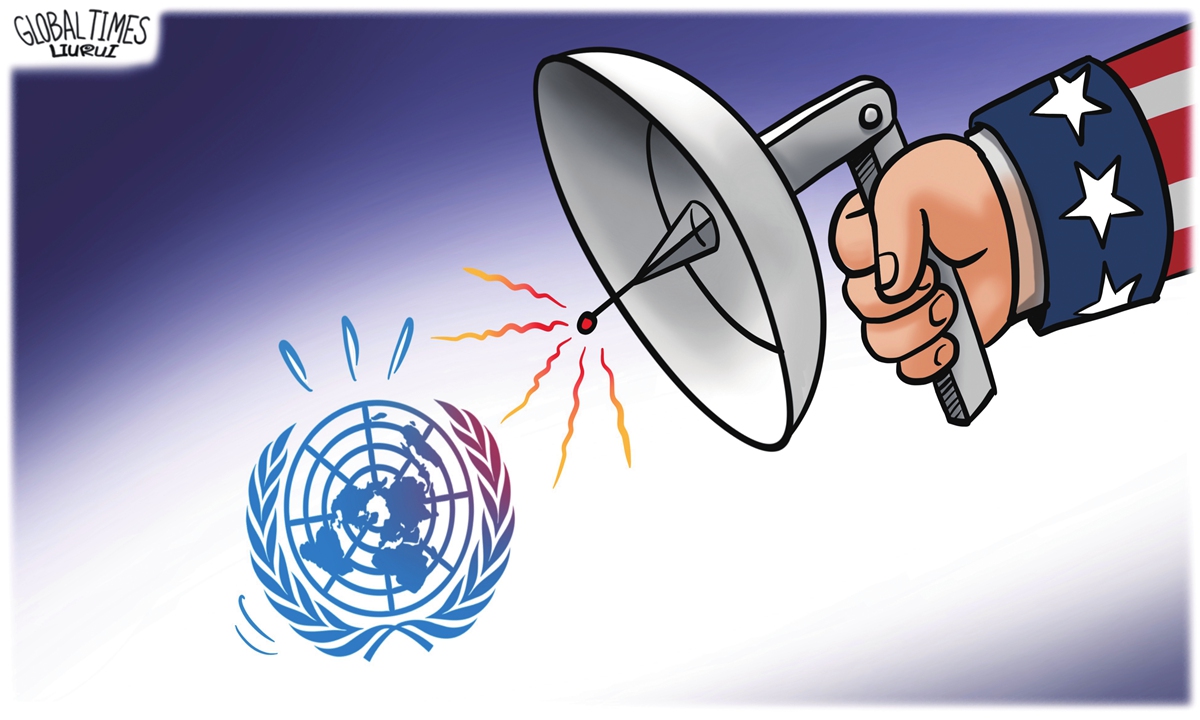
Illustration:Liu Rui/GT
Just like a greedy and evil octopus, the US intelligence community has long extended its tentacles into the United Nations (UN) through eavesdropping. Showing Washington's spying frenzy certainly has no boundary.The UN has expressed concerns to the US over reports that Washington spied on UN Secretary-General Antonio Guterres and other senior UN officials, UN spokesman Stephane Dujarric said Tuesday, according to media reports.
"We have made it clear that such actions are inconsistent with the obligations of the US as enumerated in the Charter of the UN and the Convention on the Privileges and Immunities of the UN," Dujarric said.
The BBC reported last week that Washington had been closely monitoring Guterres, and some leaked classified documents even contain the UN chief's private conversations with his deputy Amina Mohammed. Dujarric responded on April 13 that Guterres was "not surprised" about being spied on.
CNN claimed Tuesday that the UN issues "rare rebuke" of the US over leaked documents. Such a "rarity," along with the implied resignedness in the UN Secretary-General's attitude, proves one horrible reality: Washington's spying has become so commonplace that UN officials basically can do nothing about it, particularly amid Washington's superiority in information technology (IT) and constant hooliganism under its hegemonic psychology.
What is definitely not rare are reports and documents that reveal the US' surveillance of the UN. The Guardian pointed out in a 2010 article that US diplomats were instructed to spy on UN leaders, including then-Secretary General Ban Ki-moon and the representatives of the other four UN Security Council permanent members. According to some classified documents leaked in 2013, the US National Security Agency had been eavesdropping on video conferences of UN diplomats.
UN officials have condemned some of these incidents, but it is evident Washington has no intention of stopping its spying. Chinese military observer Wang Qiang told the Global Times that compared to sovereign countries, international organizations like the UN have no sovereignty at all, which places the UN in an awkward position against US surveillance. In this case, there is little use for the organization to make any complaints.
Over the years, Washington has increased its eavesdropping on others out of the so-called concerns for its own national security. In its eyes, spying can be carried out regardless of the object and intention as long as it is in the interests of the US military and the intelligence community.
The US intelligence agencies have long since become cancer to the international community. On the one hand, they serve the US hegemony by using intelligence to crack down on so-called adversaries and enemies. In addition, they use the acquired information to blackmail other countries politically. They act like a mafia without any ethical boundaries.
Wang said as long as a country seeks common, comprehensive, cooperative and sustainable security, there is no need to spy on others. Only someone as despicable as the US will engage in predatory ways to obtain intelligence, he added.
Currently, it is technically difficult to stop the US from eavesdropping. Washington still undoubtedly dominates the world's IT sector: The main framework of the global information system and many of the most popular IT products are from the US. In addition, the US has been targeting services and products provided by companies from other countries, including Chinese tech giant Huawei, and urging allies to replace them with "safer" options that are, in fact, closely linked to it. As countries around the world have widely adopted US technology, how can they escape the destiny of being monitored by Washington?
Song Zhongping, a Chinese military expert and TV commentator, believes that it is an important first move for people wanting to get rid of the US' eavesdropping to choose equipment and devices not based on US core technology.
At the same time, he noted that the international community should not allow the US surveillance empire to go unchecked. Instead, it has to raise a unified voice to resist such hegemonic behavior from Washington.
"If countries behave indifferently toward the US' spying, as some do, they will inevitably become the US' pawns and accomplices," said Song.
Nevertheless, the root of this problem lies in the US hegemony. And the only time we will be free from US surveillance is when the country's hegemonic system completely collapses. But Washington is so used to acting as a shameless hegemon that changing its mentality and behavior is almost impossible. If we want to kill Washington's spying octopus, more actions are needed to crush the US hegemony.

